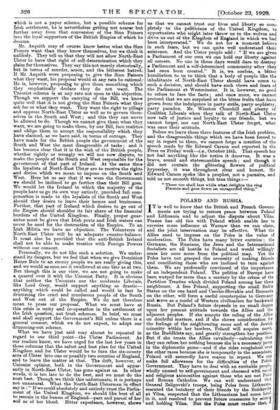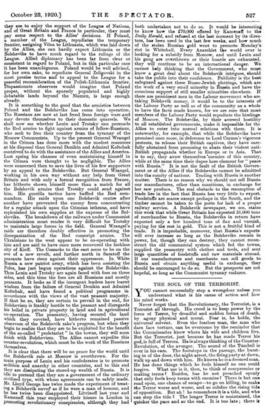POLAND AND RUSSIA.
.1rT is well to know that the British and French Govern. ments are trying to restore peace between Poland and Lithuania and to adjust the dispute about Vilna. France has old ties with Poland which enable her to exercise more influence at Warsaw than we can claim, and the joint intervention may be effective. What the Allies need to impress on the Poles is the value of moderation. The Poles have many bitter enemies ; the Germans, the Russians, the Jews and the International Socialists are all hostile to Poland and would willingly erase her once more from the political map. Yet the Poles have not grasped the necessity of making friends and conciliating those who are inclined to turn against them. We are profoundly convinced of the importance of an independent Poland. The politics of Europe have been warped for more than a century by the crime of the Partition Treaties which divided Poland among her three neighbours. A free Poland, supporting the small Bahia States on the one hand and Czecho-Slovakia and Rumania on the other, will form a useful counterpoise to Germany and serve as a model of Western civilization for backward Russia. But Poland's future depends in no small degree upon her present attitude towards the Allies and the adjacent peoples. If she accepts the ruling of the Allies on doubtful matters, and if she shows consideration for the feelings of the neighbouring races and of the Jewish minority within her borders, Poland will acquire merit, as the Buddhists say, and greatly strengthen her position. But if she treats the Allies cavalierly—calculating that they can refuse her nothing because she is a necessary pawn in the diplomatic game—and if she rides roughshod over the other races because she is temporarily in the ascendant, Poland will assuredly have reason to repent. We can n make full allowance for the difficulties of the Polish Government. They have to deal with an excitable people, wholly unused to self-government and obsessed with racial and religious animosities against those who are not Poles and Roman Catholics. We can well understand that General Zeligovski's troops, being Poles from Lithuania, resented the butchery of their friends by the Bolsheviks at Vilna, suspected that the Lithuanians had some hand in it, and resolved to prevent future massacres by sem and holding Vilna. But the Poles must realize that, they are, to enjoy the support of the League of Nations, and of Great Britain. and France in particular, they must pay some respect to the Allies' decisions. If Poland, a member of the League, repudiates the temporary frontier, assigning Vilna to Lithuania, which wan laid down by the Allies, she can hardly expect Lithuania or the Bolsheviks to have much regard to the rulings of the League. Allied diplomacy has been far from clear or oonelatent in regard to Poland, but in this particular case it has been unambiguous. Poland would be well advised, for her own sake, to repudiate General Zeligoveki in the most mobile terms and to appeal to the League for a. peamtal reoonsideration of the Polish-Lithuania frontier. lOispassionate observers would imagine that Poland proper, without the sparsely populated and highly debatable lands beyond the Niemen, is large enough already.
It is something to the good- that the armistice between Poland and the Bolsheviks has come into operation. The Russians are now at last freed from foreign wars land may devote themselves to their domestic quarrels. We shall now see whether Lenin and Trotsky can persuade the Red. armies to fight against armies of fellow-Russians, who seek to free- their country from the tyranny of the Moscow Communists. Up to the present General' Wrangel in the Crimea has done more with the modest resources at his disposal than General Denikin and Admiral Koltchak contrived to do with the assistance of-the Allies and America. Last spring his chances of- even maintaining himself in the Crimea were thought to be negligible. The Allies were concerned then to save the lives of his few supporters by an appeal to the. Bolsheviks. But General Wrangel, working in his own way without any help from Great Britain and with only a formal recognition from France, has hitherto shown himself more than a match for all the Bolshevik armies that Trotsky could send against him. His guerilla tactics have baffled the Red com- manders. His raids upon one Bolshevik centre after another have prevented the enemy from concentrating for a regular attack upon the Crimean isthmus, and have replenished his own supplies at the expense of the Bol- sheviks. The breakdown of the railways under Communist administration- must render it very difficult for Trotsky to maintain large forces• in the field. General Wrangel's raids are therefore doubly effective in promoting the disorganization of the Red conscript armies. The Ukrainians to the west appear to be co-operating with him and are said to have once more recovered the limitless city of Kieff. The Cossacks to the east seem to be on the eve of a new- revolt, and further north in Samtoff the peasants have risen against their oppressors. In White Russia a new patriot army, which has been assisting the. Poles, has just begun operations against the Bolsheviks. Thus Lenin and Trotsky are again faced with foes on three sides, and this time the foes are all Russians and mostly. peasants. It looks as if the insurgent leaders have learnt wisdom from the failure of General Denikin and Admiral Koltehak, and have found a political programme in accordance with the views of the vast peasant majority. If that be. so, they are certain to prevail in the end, for Bolshevism is frankly hostile to the peasant and disregards his belief in private property in land and in agricultural co-operation. The peasantry, having secured the land which they coveted, have hitherto remained passive observers, of the Bolshevik rake's progress, but. when they begin to realize that they are to be exploited for the benefit of the so-called " proletariat " in the towns, they will soon finish with Bolshevism. The Allies cannot expedite this counter-revolution„ which must be the work of the Russians themselves.
It is clear that there will be no peace for the world until the Bolshevik rule at Moscow is overthrown. For the main purpose of Lenin and his confederates is to promote sedition and anarchy in other countries, and to this end they are dissipating the stored-up wealth of Russia. It is idle to retend that they are a government of the ordinary ci type, with whom agreements can be safely made. Mr. Lloyd George has twice made the experiment of treat- ing a Bolshevik envoy/ as if he were a man of honour, and he has twice been disappointed. Litvinoff last ye.ar. and Rameneff this year employed their leisure in London in. promoting revolutionary conspiracies, although they had both undertaken not to do so. It would be interesting to know how the £70,000 offered by liameneff to the Daay Herald, and refused at the last moment by ita direc- tors, has been used in the last few weeks; and how much of the stolen Russian gold went to promote Monday's- not in Whitehall. Every Anarchist the world over is looking for a subsidy from Moscow, and until Lenin and his gang are overthrown or their hoards are exhausted, they will continue to be an international danger. We cannot help thinking that the Government,, who must know a great deal about the Bolshevik intrigues, should take the public into their-confidenee. Publicity is' the beet safeguard against these Russo-Jewish plottings, which are the work of a very small minority in Russia and have. the conscious support of still smaller minorities elsewhere. If there are prominent men in the Labour movement who are taking Bolshevik money, it would be to the interests of the- Labour Party as well as of the community as a whole to• have the facts made known, for we are that most members of the Labour-Party would repudiate the hirelings of Moscow. The Bolsheviks; by their avowed hostility to all established governments, make it impossible for the Allies to enter into normal relations with them. It is. noteworthy, for example, that while the Bolsheviks have promised once more, in deference to Lord Curzon's vigorous =, to release their British captives, they have oare- abstained from promising to abate their violent anti- British propaganda whether in Europe or in Asia. That is to say, they avow themselves .'enemies of this country, while at the same time their dupes here clamour for " peace with. Russia." It is not the fault. of the. British Govern- ment or of the Allies if the Bolsheviks cannot be admitted into the comity of nations. Trading with Russia is another matter. There is no reason why we should not sell Russia our manufactures, other than munitions, in exchange for her raw produce. The real obstacle to the, resumption of trade lies in the fact that Russia has• very little to export. Foodstuffs are scarce except perhaps in the South, and the timber cannot be taken to the ports for lack of a proper railway service. A Bolshevik newspaper, we see, states this week that while Great Britain has31,000 tons of merchandise to Russia, the BolshetZritdreturn have exported only a few hundred tons of flax and varnish, paying for the rest in gold. This is not a fruitful kind of trade. It is improbable, moreover, that Russia's exports will ever increase so long as the Bolsheviks remain in power,, for, though they can destroy, they cannot recon- struct the old commercial system which fed the towns, supplied the peasantry with clothes and tools, and sent large quantities of foodatuffa and raw materials abroad. If our manufacturers and merchants can sell goods to Russia and obtain anything useful in exchange, they should be- encouraged to do so. But the prospects are not hopeful, so long as the Communist tyranny endures.



































 Previous page
Previous page